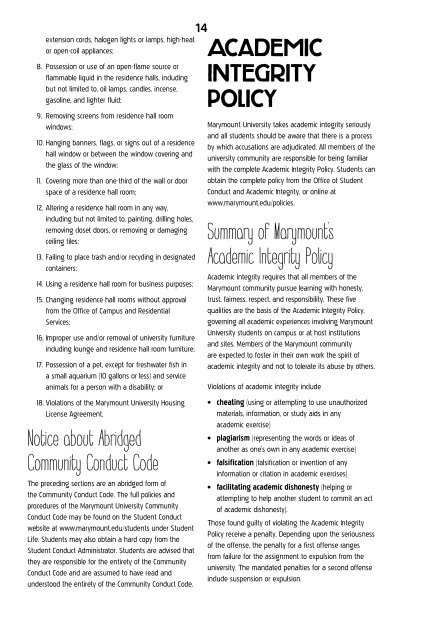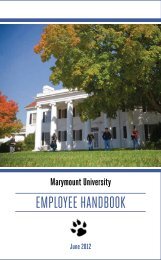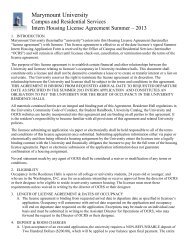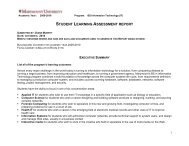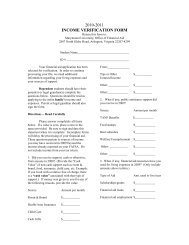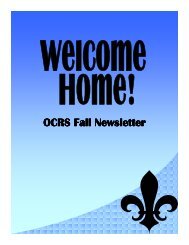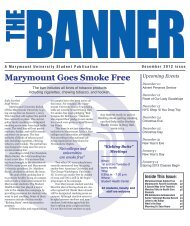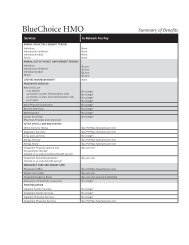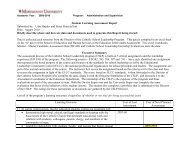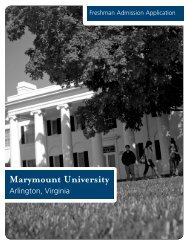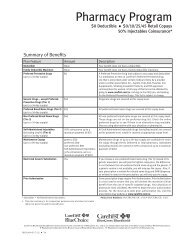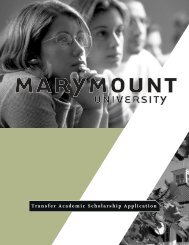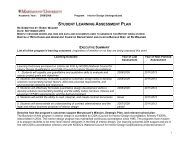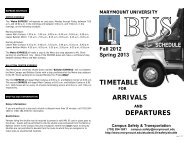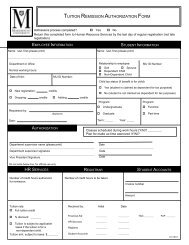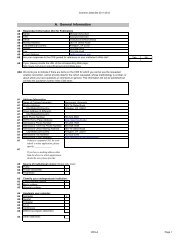Student Handbook - Marymount University
Student Handbook - Marymount University
Student Handbook - Marymount University
You also want an ePaper? Increase the reach of your titles
YUMPU automatically turns print PDFs into web optimized ePapers that Google loves.
extension cords, halogen lights or lamps, high-heat<br />
or open-coil appliances;<br />
8. Possession or use of an open-flame source or<br />
flammable liquid in the residence halls, including<br />
but not limited to, oil lamps, candles, incense,<br />
gasoline, and lighter fluid;<br />
9. Removing screens from residence hall room<br />
windows;<br />
10. Hanging banners, flags, or signs out of a residence<br />
hall window or between the window covering and<br />
the glass of the window;<br />
11. Covering more than one-third of the wall or door<br />
space of a residence hall room;<br />
12. Altering a residence hall room in any way,<br />
including but not limited to, painting, drilling holes,<br />
removing closet doors, or removing or damaging<br />
ceiling tiles;<br />
13. Failing to place trash and/or recycling in designated<br />
containers;<br />
14. Using a residence hall room for business purposes;<br />
15. Changing residence hall rooms without approval<br />
from the Office of Campus and Residential<br />
Services;<br />
16. Improper use and/or removal of university furniture<br />
including lounge and residence hall room furniture;<br />
17. Possession of a pet, except for freshwater fish in<br />
a small aquarium (10 gallons or less) and service<br />
animals for a person with a disability; or<br />
18. Violations of the <strong>Marymount</strong> <strong>University</strong> Housing<br />
License Agreement.<br />
Notice about Abridged<br />
Community Conduct Code<br />
The preceding sections are an abridged form of<br />
the Community Conduct Code. The full policies and<br />
procedures of the <strong>Marymount</strong> <strong>University</strong> Community<br />
Conduct Code may be found on the <strong>Student</strong> Conduct<br />
website at www.marymount.edu/students under <strong>Student</strong><br />
Life. <strong>Student</strong>s may also obtain a hard copy from the<br />
<strong>Student</strong> Conduct Administrator. <strong>Student</strong>s are advised that<br />
they are responsible for the entirety of the Community<br />
Conduct Code and are assumed to have read and<br />
understood the entirety of the Community Conduct Code.<br />
14<br />
Academic<br />
Integrity<br />
Policy<br />
<strong>Marymount</strong> <strong>University</strong> takes academic integrity seriously<br />
and all students should be aware that there is a process<br />
by which accusations are adjudicated. All members of the<br />
university community are responsible for being familiar<br />
with the complete Academic Integrity Policy. <strong>Student</strong>s can<br />
obtain the complete policy from the Office of <strong>Student</strong><br />
Conduct and Academic Integrity, or online at<br />
www.marymount.edu/policies.<br />
Summary of <strong>Marymount</strong>’s<br />
Academic Integrity Policy<br />
Academic integrity requires that all members of the<br />
<strong>Marymount</strong> community pursue learning with honesty,<br />
trust, fairness, respect, and responsibility. These five<br />
qualities are the basis of the Academic Integrity Policy,<br />
governing all academic experiences involving <strong>Marymount</strong><br />
<strong>University</strong> students on campus or at host institutions<br />
and sites. Members of the <strong>Marymount</strong> community<br />
are expected to foster in their own work the spirit of<br />
academic integrity and not to tolerate its abuse by others.<br />
Violations of academic integrity include<br />
• cheating (using or attempting to use unauthorized<br />
materials, information, or study aids in any<br />
academic exercise)<br />
• plagiarism (representing the words or ideas of<br />
another as one’s own in any academic exercise)<br />
• falsification (falsification or invention of any<br />
information or citation in academic exercises)<br />
• facilitating academic dishonesty (helping or<br />
attempting to help another student to commit an act<br />
of academic dishonesty).<br />
Those found guilty of violating the Academic Integrity<br />
Policy receive a penalty. Depending upon the seriousness<br />
of the offense, the penalty for a first offense ranges<br />
from failure for the assignment to expulsion from the<br />
university. The mandated penalties for a second offense<br />
include suspension or expulsion.


